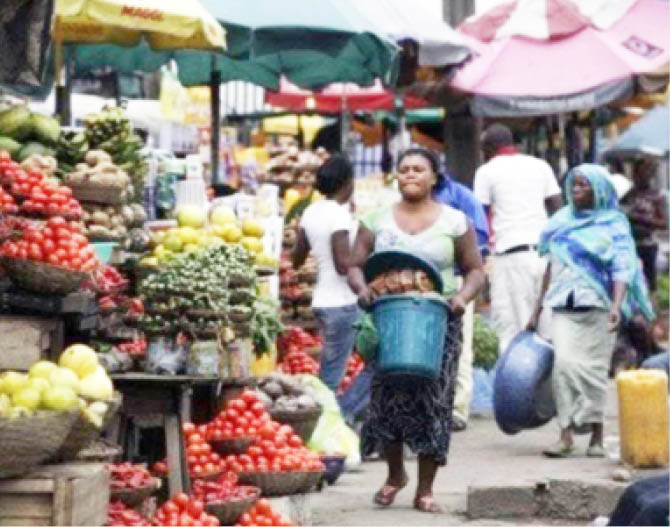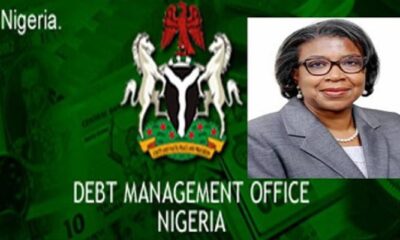Business
We didn’t use national assets as collateral for Chinese loans – DMO

The Debt Management Office has said no national asset was used as collateral for loans from China.
Director-General of the DMO, Patience Oniha, said this during an interview with NAN on Saturday.
In recent times, both social and mainstream media have been awash with news about some African countries, including Nigeria, facing the threat of losing critical national assets to the Asian country owing to high-level indebtedness.
Media reports had also claimed that Uganda has “surrendered” its only international airport and other assets in the country to China over an unpaid loan deal — a claim both both countries have denied.
Reacting to the reports, Oniha said the loans from China to Nigeria were largely concessional, as no national asset was tagged as collateral.
She also disclosed that Chinese loans which presently stood at $3.59 billion constitutes only 9.4 percent of the Nigeria’s total foreign debt stock of $37.9 billion.
“Nigeria’s total debt stock as at Sept. 30 was 37.9 billion dollars, this figure comprised the external debt stock of the Federal Government, 36 state governments and the Federal Capital Territory,” Oniha was quoted as saying.
“But total loans from China stands at 3.59 billion dollars, which is 9.47 per cent of the total external debt. The loans did not require any national asset as collateral; they were largely concessional.”
Oniha asked Nigerians to always endeavour to verify sensitive information from official sources before disseminating it.
She said before foreign loans are procured, sensitive steps are taken by multiple institutions of government to ensure that they are beneficial to the nation.
“Before any foreign loan is contracted, including the issuance of Eurobond, they are approved by the Federal Executive Council and thereafter, the National Assembly,” Oniha said.
“An important and extremely critical step is that the loan agreements are approved by the Federal Ministry of Justice.
“An opinion is issued by the Attorney-General of the Federation and Minister of Justice before the agreements are signed.
“Several measures which operate seamlessly have been put in place to ensure that data on debt are available and that debt is serviced as at when due. Provisions are made explicitly for debt service in the annual budgets.”
The DMO chief said loan agreements provide a number of steps to take to resolve disputes when they arise.
“The first action is that the parties should resolve it within themselves and if that fails, they go to arbitration,” she said.
“In other words, a lender, in this case, China, would not just pounce on an asset at the first sign of a dispute, including defaults.’’
She said the DMO maintains proper records of debts, provides projections for debt service and processes the actual payments for debt service.
Those functions, Oniha said, were carried out in conjunction with the Office of the Accountant-General of the Federation and the Central Bank of Nigeria.
Business
Naira Maintains Stability Against Dollar as CBN FX Measures Keep Markets Calm

Naira Maintains Stability Against Dollar as CBN FX Measures Keep Markets Calm
The Nigerian Naira showed relative stability against the United States Dollar during Tuesday, February 17, 2026, trading sessions in both official and parallel foreign exchange markets. After a weekend of consolidation, the local currency continued to hover around the ₦1,350 band, reflecting the effectiveness of the Central Bank of Nigeria’s (CBN) liquidity management policies.
In the official Nigerian Foreign Exchange Market (NFEM), the Naira opened at ₦1,351.18 per dollar and adjusted slightly by mid-morning to ₦1,354.86, a movement attributed to early-week corporate demand. Analysts say the Electronic Foreign Exchange Matching System (EFEMS) and the Monetary Policy Rate (MPR) have helped anchor the official exchange rate below the ₦1,400 mark for over two weeks, providing a predictable environment for businesses and investors.
READ ALSO:
- 28 Wedding Guests Die in Separate Road, Boat Accidents in Enugu, Kebbi
- FG, Progressive Governors Forum Pledge ₦8bn Relief for Singer Market Fire Victims
- Former INEC REC Warns of “Chaos” in 2027 Over E-Transmission of Election Results
Meanwhile, in the parallel market, the Naira traded at a traditional premium, ranging from ₦1,380 to ₦1,440 per dollar in commercial hubs like Lagos, Abuja, and Kano. Traders reported sufficient dollar supply for personal travel and small-scale business transactions, noting that the narrowing gap between official and parallel rates has discouraged speculative hoarding and improved market efficiency.
Recent CBN interventions, including expanding access to licensed Bureau De Change operators and enforcing regulatory compliance, have strengthened FX liquidity, allowing for more transparent price discovery. Combined with Nigeria’s moderating inflation rates and robust external reserves of around $49 billion, these measures have bolstered confidence in the Naira and helped limit excessive volatility.
Market watchers, however, caution that challenges remain, including uneven foreign exchange inflows and persistent demand pressures in the informal sector. Sustaining the Naira’s stability in the coming weeks will depend on continued policy consistency, enhanced liquidity provision, and investor participation across sectors.
Summary of Rates on February 17, 2026:
- Official NFEM Opening: ₦1,351.18 per $1
- Official NFEM Mid-Morning: ₦1,354.86 per $1
- Parallel Market Range: ₦1,380 – ₦1,440 per $1
Analysts remain cautiously optimistic that the Naira can maintain its stability and momentum for the remainder of February, provided that external reserves and FX supply measures continue to support the market.
Naira Maintains Stability Against Dollar as CBN FX Measures Keep Markets Calm
Business
Dokpesi Jr, Ex-GMD Akiotu Clash Over DAAR Communications Mgt Restructuring

Dokpesi Jr, Ex-GMD Akiotu Clash Over DAAR Communications Mgt Restructuring
A public dispute has erupted at DAAR Communications Plc as Chairman Raymond Dokpesi Jr and former Group Managing Director, High Chief Tony Akiotu, publicly clashed over the company’s recent management restructuring, raising questions about corporate governance and the legacy of Nigeria’s pioneering media organisation.
Speaking in Abuja, Dokpesi Jr defended the executive shake-up, stating he has “no regrets” about the decisions made following the sudden death of the company’s founder, Raymond Aleogho Dokpesi Sr. He described the departure of long-serving executives as a difficult but necessary step to ensure stability, investor confidence, and future growth. The chairman noted that the company faced challenges after his father’s passing, including declining share value and reduced investor confidence, and emphasised that the transition process was carefully managed to minimise tension.
READ ALSO:
- EFCC Holds El-Rufai Overnight Over ₦423bn Kaduna Corruption Allegations
- Troops Intercept ₦37m Terror Funds, Phones, ISWAP Logistics in Borno Operations
- X Restored After Global Outage Disrupts Millions Worldwide
Dokpesi Jr acknowledged that the exiting executives were owed salary arrears and other entitlements, which the organisation has been settling, amounting to billions of naira accumulated over their 15-year tenure. He explained that the restructuring allowed the company to prioritise outstanding obligations and improve operational efficiency, with most business units now financially independent and others expected to achieve autonomy before the end of the year. “I will continue to apologise to Mr Tony Akiotu and the affected management staff for any hurt feelings,” he said, “but I have no regrets — the results validate the decision.”
In response, Akiotu criticised Dokpesi Jr’s statement as unfair and misleading. He argued that it was inappropriate for a chairman who presided over board meetings and approved management memos to later accuse the same leadership team of mismanagement. Akiotu highlighted that all major operational and financial decisions during his tenure were subject to board approval, and that the team had contributed significantly to the company’s growth into a national and international media brand, with operations spanning Nigeria, the United Kingdom, and the United States.
Akiotu also noted that while executive retirements may be permissible under corporate regulations, the public portrayal of their tenure overlooked the sacrifices made to build one of Nigeria’s pioneering broadcast institutions. “If Raymond Dokpesi Jr believes we played no part in the growth of the company, we leave it to Nigerians and history to make that judgment,” he said.
Industry observers say the dispute underscores ongoing debates about corporate governance, leadership succession, and strategic reform within DAAR Communications, which continues to be a major player in Nigeria’s broadcast media sector. Both parties have called for dialogue, but the public nature of the clash has drawn attention across the media and business community, with speculation over potential boardroom changes and the company’s future direction.
Dokpesi Jr, Ex-GMD Akiotu Clash Over DAAR Communications Mgt Restructuring
Business
Inflation Slows to 15.10% as Food Prices Eased in January

Inflation Slows to 15.10% as Food Prices Eased in January
Nigeria’s inflation rate recorded a marginal decline to 15.10 per cent in January 2026, signalling a slight moderation in consumer prices at the start of the year.
Latest data released on Monday by the National Bureau of Statistics (NBS) showed that headline inflation dipped from 15.15 per cent in December 2025, reflecting a 0.05 percentage point decrease.
The NBS, in its January Consumer Price Index (CPI) report, also revealed that food inflation — a key driver of household spending pressures — eased significantly to 8.89 per cent in January, down from 10.84 per cent recorded in December.
According to the bureau, the CPI dropped to 127.4 points in January from 131.2 points in the preceding month, representing a 3.8-point decline.
On a month-on-month basis, inflation fell sharply to -2.88 per cent in January, compared to 0.54 per cent in December — a 3.42 percentage point swing.
This indicates that the average price level not only slowed but contracted within the month under review.
“The Consumer Price Index (CPI) declined to 127.4 in January 2026, reflecting a 3.8-point decrease from the preceding month (131.2),” the NBS stated.
It added, “In January 2026, the headline inflation rate eased to 15.10%, down from 15.15% in December 2025.
“On a month-on-month basis, the headline inflation rate in January 2026 was -2.88%, which was 3.42% lower than the rate recorded in December 2025 (0.54%).”
The moderation in both headline and food inflation may offer cautious optimism for households and policymakers, particularly amid ongoing economic reforms and cost-of-living concerns.
However, analysts note that while the decline suggests easing price pressures, the overall inflation rate remains elevated, keeping purchasing power under strain.
-

 Education2 days ago
Education2 days agoCheck Your Name: UNILORIN Releases Updated NELFUND Refund List for 2024/2025 Students
-

 News2 days ago
News2 days agoOsogbo Sons and Daughters Mark 5th Anniversary with Awards, Political Undertones
-

 metro3 days ago
metro3 days agoWoman Arrested Over Murder of Nigerian E-Hailing Driver in South Africa
-

 metro1 day ago
metro1 day agoUS Freezes Assets of Eight Nigerians Over Boko Haram, ISIL, Cybercrime Links
-

 News2 days ago
News2 days agoAfenifere Calls for Immediate Take-Off of State Police as Terror Threats Rise in Yorubaland
-

 metro3 days ago
metro3 days agoBoko Haram Terrorists Release Video of 176 Abducted Kwara Residents
-

 metro1 day ago
metro1 day agoTerror in Lagos Traffic: Cutlass Gang Unleashes Mayhem on Mile 12–Ketu Road
-

 metro2 days ago
metro2 days agoUS Military Boosts Support for Nigeria’s Fight Against Insurgency With Ammunition, Troop













